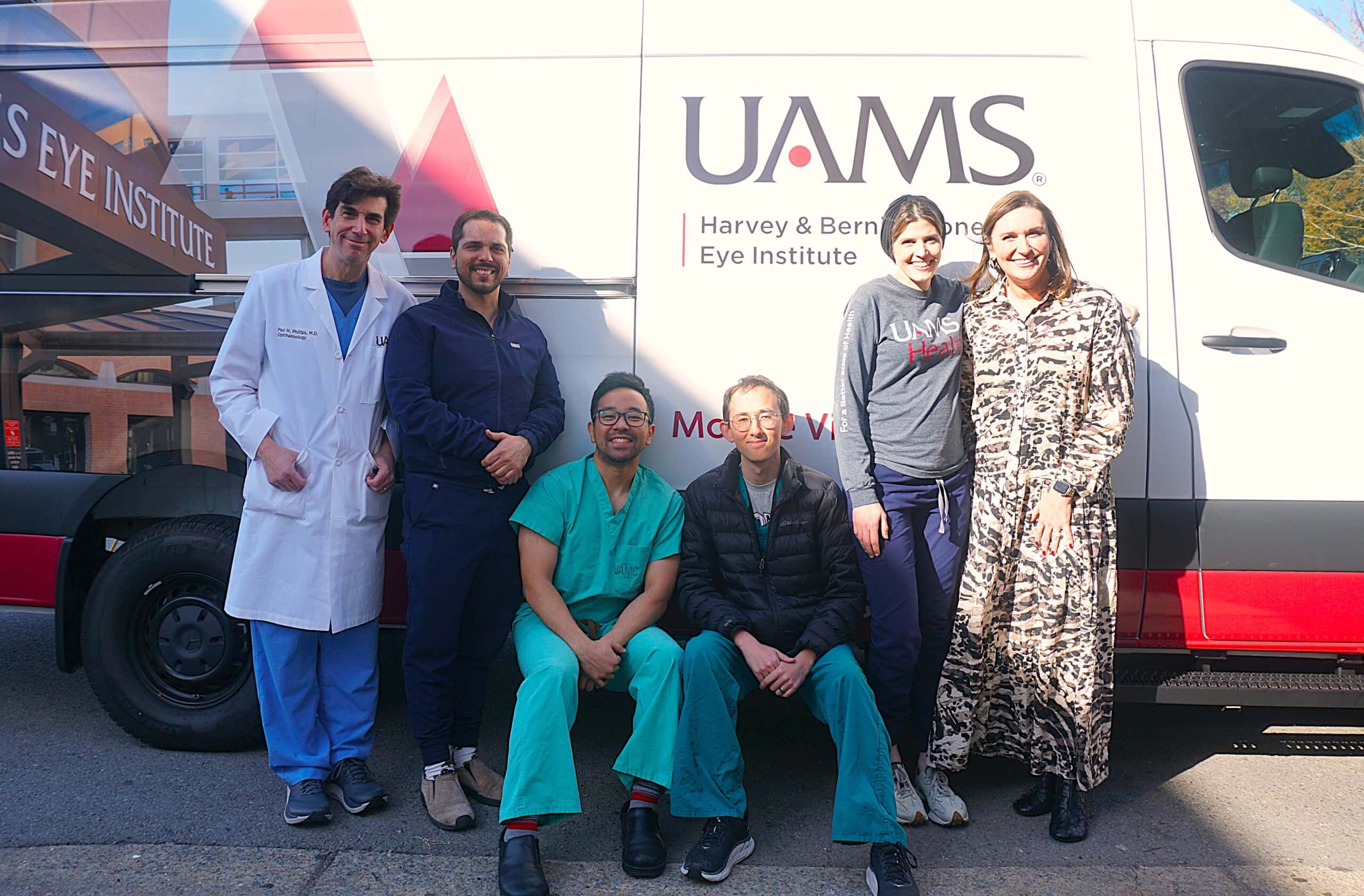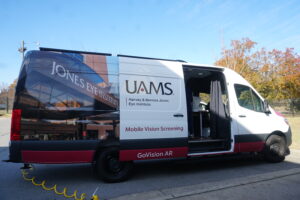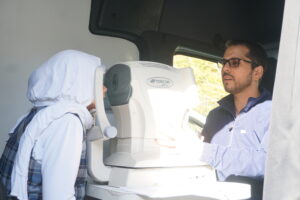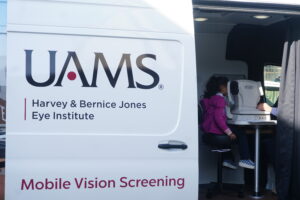View Larger Image

(From left) Paul Phillips, M.D., Zain Chauhan, M.D., Joshua Shin, M.D., Alex Kwok, M.D., MPH, Sajida Chauhan, and Blue & You Foundation President Rebecca Pittillo stand in front of the new GoVision AR van.
Image by Benjamin Waldrum
UAMS GoVision Van Rolls Out, Screens First Patients
| The University of Arkansas for Medical Sciences (UAMS)’ new mobile vision screening unit made its debut on Dec. 10. More than 90 students were signed up for screening, with physicians performing free eye exams for those in kindergarten through eighth grade at Huda Academy in downtown Little Rock.

GoVision AR was made possible by a $175,000 grant in April from the Blue & You Foundation for a Better Arkansas.Benjamin Waldrum
In April, UAMS received a $175,000 grant from the Blue & You Foundation for a Healthier Arkansas to support GoVision AR: Mobile Vision Screening for Underserved Children Across Arkansas. The UAMS Department of Ophthalmology oversees the project, which aims to address significant disparities in access to vision care and unmet vision care needs for underserved children across the state.
“The GoVision AR program will markedly improve vision care access for children and adults throughout Arkansas,” said Paul Phillips, M.D., professor and chair of the Department of Ophthalmology and director of the UAMS Harvey & Bernice Jones Eye Institute. “Increased access will lead to improved follow-up rates and better vision outcomes and will help identify barriers to care so we can form strategies to address them. We’re grateful to the Blue & You Foundation for a Healthier Arkansas for their support of this project.”
“The Blue & You Foundation for a Healthier Arkansas is so pleased to support the UAMS GoVision program and appreciates the comprehensive approach to providing access to free eye health to underserved children across Arkansas,” said Blue & You Foundation President Rebecca Pittillo. “Because of this service, students in our state will have an improved quality of life.”
GoVision AR will collaborate with various community partners going forward, including school districts, parent-teacher associations, community health centers and nonprofit vision care organizations, along with other local optometrists and ophthalmologists. A smaller school like Huda Academy, which has about 200 students total, was perfect for a trial run of the van to make sure everything ran smoothly, Phillips said.
“Huda Academy graciously allowed us to come to their school and have their students be the first to benefit from these screenings,” Phillips said. “Having our residents do this work on a smaller scale will benefit us as we scale up the GoVision program for larger populations.”
“We are very excited to have the Jones Eye Institute come to our school and give students the opportunity to have eye exams,” said Israa Khreiwesh, an office manager at the school. “Some of them are going home today with prescriptions for glasses that they didn’t know they needed.”
The van parked at Huda Academy around 9 a.m. and spent the school day screening students two at a time. Each student was assessed with the same group of eye tests that would normally be performed during an ophthalmology visit. Zain Chauhan, M.D., a resident physician in the Department of Ophthalmology and lead grant writer for GoVision, along with fellow residents Alex Kwok, M.D., MPH, and Joshua Shin, M.D., performed the screenings.
“This project addresses a fundamental inequity that children should not have to face — access to basic health care,” Chauhan said. “This mobile clinic represents not only a step toward addressing a physical need but also a move toward creating a more equitable future for these children. It’s personal for all of us because we see how much vision affects a child’s ability to engage in school and life, and we have the tools to change that.”
Department of Ophthalmology research indicates significant nationwide disparities in access to vision care and eye health among children, particularly in low-income families and minority groups in Southern states. Children in Arkansas who fail school vision screenings have significantly inadequate follow-up eye care, which the study found correlates with key indicators of socioeconomic status, such as race, poverty, insurance coverage and academic achievement.
Chauhan said the program will eventually expand to include screenings for diabetic retinopathy and other interventions for adults. Diabetic retinopathy, a condition in which too much blood sugar damages the retina, is the leading cause of blindness in working-age adults ages 20-74, according to National Eye Institute data. About 15% of Arkansans have diabetes.
By increasing access to eye care for vulnerable populations, Chauhan said the GoVision program should reduce preventable vision impairment in children, and result in enhanced understanding of the impact of social determinants of health on eye patients.

